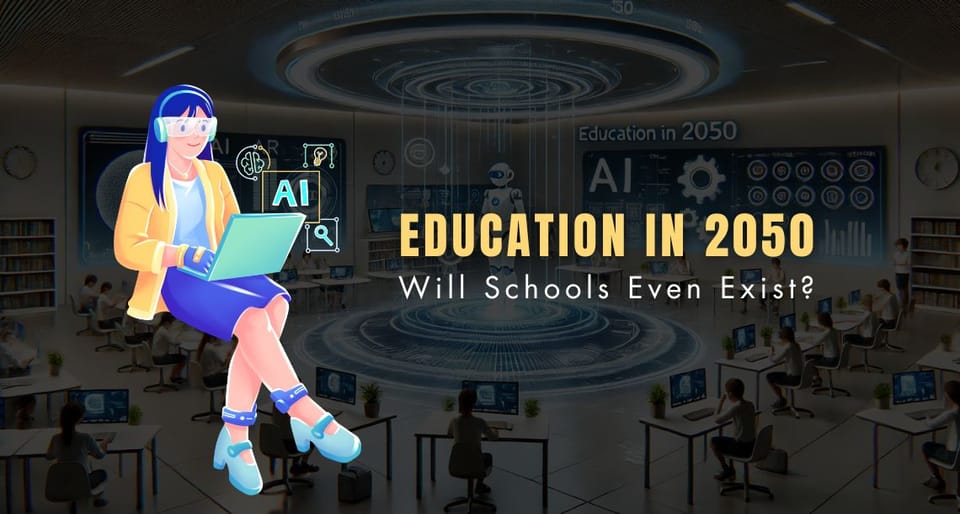Education in 2050: Will Schools Even Exist?

Education has evolved more in the last two decades than in the previous hundred years. From blackboards to smartboards, textbooks to tablets, and physical classrooms to virtual learning, the transformation has been rapid. But the big question remains—will schools even exist in 2050?
As technology accelerates at an unprecedented pace, artificial intelligence, virtual reality, and personalized learning are reshaping the education system. Will schools as we know them become obsolete, or will they adapt to a world dominated by digital learning?
1. The Traditional Schooling Model is Already Changing
For centuries, schools have followed the one-size-fits-all model. Students sit in classrooms, listen to lectures, memorize information, and take standardized exams. However, the flaws in this system are becoming more evident.
- Not all students learn at the same pace.
- Rote memorization doesn’t foster critical thinking.
- Standardized tests don’t measure real-world skills.
The pandemic in 2020 forced a shift towards online learning, proving that traditional classrooms are no longer the only way to educate students. By 2050, schools will either evolve into learning hubs or disappear altogether.
2. AI-Powered Personalized Learning: The New Normal?
Imagine an education system where:
- AI tutors teach students at their own pace.
- Personalized curriculums adapt to a student’s strengths and weaknesses.
- Virtual classrooms allow students to learn from anywhere in the world.
AI will replace standardized learning with personalized learning. Students will no longer be forced into rigid curriculums but instead will learn what interests them at their own speed.
Big EdTech companies are already working on AI-based tutors. By 2050, human teachers might be replaced by AI mentors who understand a student’s emotional and cognitive needs better than a human ever could.
3. Virtual & Augmented Reality: The End of Physical Schools?
Why sit in a classroom when you can:
- Explore Ancient Egypt in VR instead of reading about it?
- Conduct science experiments in a virtual lab with zero risks?
- Learn history by interacting with historical figures through AI avatars?
By 2050, classrooms might exist in the metaverse, where students wear VR headsets and attend interactive sessions with teachers and peers from across the globe. Physical schools might become obsolete as students "attend" virtual schools from home.
Countries like South Korea and the UAE are already experimenting with metaverse education, and by 2050, this could be the primary mode of learning.
4. Skills Over Degrees: The Death of Traditional Exams
By 2050, degrees may no longer hold the same value as they do today. Employers are already shifting towards skill-based hiring rather than relying on college degrees.
Future students will focus on:
- Coding, AI, and blockchain instead of irrelevant subjects.
- Creative problem-solving and emotional intelligence over rote memorization.
- Real-world internships rather than outdated classroom learning.
The future education system will prioritize practical skills over theoretical knowledge, leading to a decline in traditional universities and standardized tests.
5. The Rise of Self-Learning & Decentralized Education
With platforms like YouTube, MasterClass, Udemy, and Coursera, students today already have access to world-class education without attending a traditional school.
By 2050, this trend will expand into:
- Decentralized learning hubs where students choose their subjects.
- AI-curated curriculums that update in real-time based on industry demands.
- Peer-to-peer learning networks where students teach and learn from each other.
Education will no longer be dictated by institutions but will be a self-driven process, empowering students to create their own learning paths.
Will Teachers Become Obsolete?
With AI, VR, and self-learning platforms, do we still need human teachers?
Not entirely. While AI will handle technical instruction, teachers will still be crucial in:
- Mentoring students on emotional and social intelligence.
- Providing real-world experiences that AI can’t replicate.
- Inspiring students and nurturing creativity.
Teachers won’t disappear, but their roles will change. They will transition from lecturers to guides, helping students navigate their own learning journeys rather than dictating lessons.
Will Schools Exist in 2050?
Schools as we know them may not exist. Instead, we might see:
Hybrid learning hubs blending virtual and physical interactions.
AI-driven, personalized education that adapts to each student.
Metaverse classrooms making learning truly global.
Skill-based education replacing traditional degrees.
Education in 2050 will be borderless, flexible, and personalized. The age of memorization-based education will die, making way for skills, innovation, and creativity.
FAQ
1. Will traditional schools still exist in 2050?
While traditional schools may still exist, their role and structure will likely evolve. With advancements in AI, virtual reality (VR), and online learning, schools may shift towards personalized, technology-driven education models.
2. What role will AI play in future education?
AI will revolutionize education by providing customized learning experiences, real-time feedback, and automated grading. AI tutors will help students learn at their own pace, reducing the need for physical classrooms.
3. Will students still need teachers in 2050?
Yes, but their roles may shift from being primary knowledge providers to mentors and facilitators. Teachers will guide students through problem-solving, creativity, and emotional intelligence—skills that AI cannot replace.
4. How will virtual reality (VR) impact education?
VR will make learning immersive, allowing students to explore historical events, conduct science experiments, and visit virtual campuses from anywhere in the world, making education more engaging and interactive.
5. Will students still attend physical schools, or will everything be online?
A hybrid model is likely. While online platforms will dominate, some in-person learning experiences, such as social interactions, hands-on experiments, and team collaborations, will still require physical presence.
6. How will students be assessed in 2050?
Standardized tests may become obsolete. Instead, real-time skill assessments, project-based evaluations, and AI-driven performance tracking will take center stage to measure students’ abilities effectively.
7. What subjects will be most important in 2050?
STEM (Science, Technology, Engineering, Math) will remain crucial, but soft skills like emotional intelligence, adaptability, creativity, and critical thinking will become just as important.
8. Will university degrees still be necessary?
Degrees may hold less importance as skill-based certifications, micro-credentials, and lifelong learning platforms gain traction. Employers might prioritize practical knowledge and problem-solving abilities over traditional degrees.
9. Will students have physical textbooks?
Physical textbooks will likely become obsolete. Digital resources, interactive AI-driven learning tools, and smart devices will replace traditional books, making education more adaptive and environmentally friendly.
10. What are the biggest challenges for education in 2050?
- Ensuring equal access to advanced technology
- Preventing over-reliance on AI and digital tools
- Maintaining human interaction and emotional learning
- Addressing cybersecurity and data privacy issues
11. How can students and parents prepare for this future?
Embracing digital literacy, encouraging continuous learning, and adapting to new technological tools will be key. Parents should focus on helping their children develop problem-solving, creativity, and adaptability skills.






Member discussion